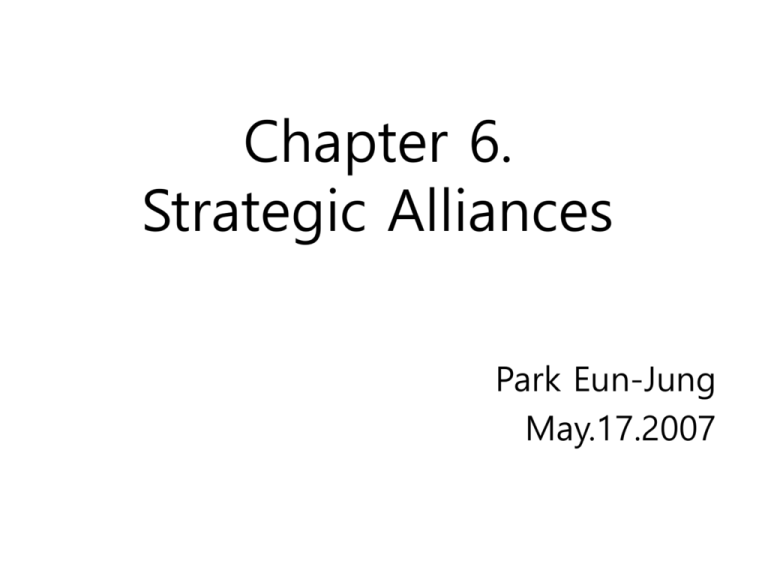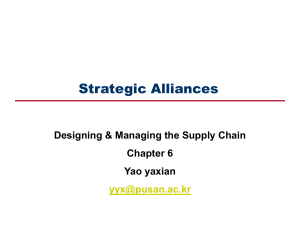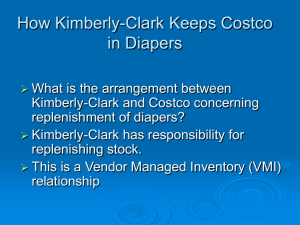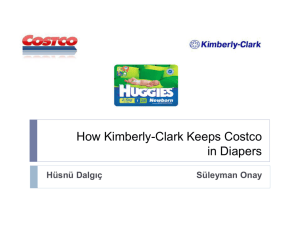Ch.6 :Strategic Alliances
advertisement

Chapter 6. Strategic Alliances Park Eun-Jung May.17.2007 Contents 1. Case> How Kimberly-Clark Keeps Client Costco in Diapers 2. Introduction 3. Framework for strategic alliances 4. Third-party Logistics 5. Retailer-supplier Partnerships 6. Distributor Integration Strategies for SCM all of the advanced strategies, techniques, and approaches for Supply Chain Management focus on : ◈ Global Optimization ◈ Managing Uncertainty Dealing with Uncertainty Pull systems Risk Pooling Centralization Postponement Strategic Alliances Collaborative Forecasting Case> How Kimberly-Clark Keeps Client Costco in Diapers Kimberly-Clark : manufacturer Costco : retailer Kimberly-Clark replenished stock of Costco in diapers Costco didn’t need to manage the stock. Shared information about individual stores’ sales Kimberly-Clark used the computer link and employed data analyst Case> How Kimberly-Clark Keeps Client Costco in Diapers Kimberly-Clark and Costco used VMI(VenderManaged Inventory) Effect : Reduce inventory levels of Costco, Saving costs, increase sales of Kimberly-Clark, improve service levels 6.1 Introduction Internal activities A firm can perform the activity using internal resources and expertise Acquisitions Acquire a firm which have the expertise or specialized resources Arm’s-length transactions Strategic alliances 6.2 Framework for Strategic Alliances To determine whether a particular strategic alliance is appropriate for your firm, consider following issues : Adding value to products Improving market access Strengthening operations Adding technological strength Enhancing strategic growth Enhancing organizational skills Building financial strength 6.3 Third-Party Logistics What is 3PL? Take over some for all of company’s logistics responsibilities Outside company to perform all or part of the firm’s materials management and product distribution functions 6.3 Third-Party Logistics Advantages and Disadvantages of 3PL Advantages ① 3PL allows a company to focus on its core competencies ② 3PL provider constantly update their information technology and equipment ③ Flexibility in geographic locations, service, resource and workforce Disadvantages ① Loss of control 6.3 Third-Party Logistics 3PL Issues and Requirements - Consider following issues when a firm contract with 3PL provider : Know firm’s own cost Customer orientation of the 3PL Specialization of the 3PL Asset-owning versus non-asset-owning 3PL 6.4 Retailer-Supplier Partnerships Types of RSP Quick Response Strategy - Supplier receives POS data from retailer and uses this information - Improve forecasting and scheduling and reduce lead time Ex 6-6) Milliken and Company uses POS data synchronize their ordering and manufacturing plans reduce the lead time Continuous Replenishment Strategy - POS data are used to prepare shipments - Maintain specific levels of inventory 6.4 Retailer-Supplier Partnerships Advanced Continuous Replenishment Strategy - Improve the inventory levels continuously - Inventory levels change the appropriate level Vendor-Managed Inventory(VMI) System - The Goal is to eliminate retailer oversight on specific orders - Inventory turnover of Wal-Mart was increased through the VMI system - P&G deliveries improved dramatically 6.4 Retailer-Supplier Partnerships 6.4 Retailer-Supplier Partnerships Requirements for RSP Advanced Information System - EDI(Electronic Data Interchange) and POS - Bar Coding and Scanning Top Management Commitment Partners to develop a certain level of trust 6.4 Retailer-Supplier Partnerships Inventory Ownership in RSP - Inventory ownership must be cleared to the success of this kind of strategic alliance effort - In VMI system, supplier owns the goods until they are sold retailer reduce inventory cost, supplier manage inventory effectively 6.4 Retailer-Supplier Partnerships Steps in RSP Implementation The contractual terms of the agreement must be negotiated - decisions concerning ownership, credit terms, ordering responsibilities, performance measures Developing the integrated information system, effective forecasting technique and a tactical decision support tool 6.4 Retailer-Supplier Partnerships Advantages and Disadvantages of RSP Advantages - Supplier controls the bullwhip effect - Reduce overall system cost and improve overall system service levels - Reduce forecast uncertainties - Reduce safety stocks, storage costs and delivery costs Disadvantages - Employ advanced technology - Develop trust - Supplier has much more responsibility in strategic partnership - Increase supplier’s managerial responsibilities and inventory costs 6.4 Retailer-Supplier Partnerships Successes and Failures Successes - VMI program of between Wal-Mart and MeadJohnson increased inventory turns - Scott Paper Company’s VMI program improved inventory turns Failures - Schering-Plough Healthcare Products and Kmart’s Partnership didn’t improve sales or profits, but decreased stockouts at Kmart - Spartan Store’s lead time was not decrease and didn’t trust supplier 6.5 Distributor Integration Use the expertise and inventory at the others Types of Distributor Integration Inventory-related - a large pool of inventory , lowering total inventory costs, raising service levels Service-related - Meet a customer’s specialized technical service requests 6.5 Distributor Integration Issues in Distributor Integration Distributor may be skeptical of the rewards of participating in such as a system Distributor might be nervous about losing these skills and abilities A large commitment of resources and effort on the part of the manufacturing company





